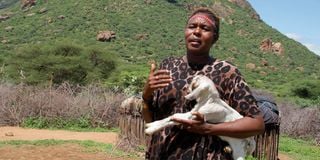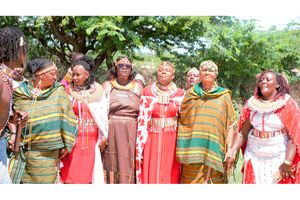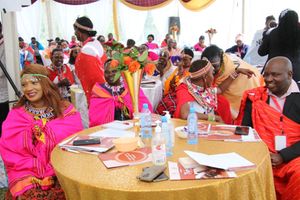
Jane Meriwas during an interview at Kipsing village in Isiolo County on May 23, 2024.
At Kililo village in Isiolo County, everyday life revolves around livestock and the presence or lack of pasture spells either boom or gloom.
Women and their daughters wake up at sunrise to milk sheep, goats and cows before the animals are driven out to the grazing fields by youngsters, to return just before dusk.
This is the village where Jane Naini Meriwas was born about four decades ago and spent the better part of her childhood. Formal education was not yet prioritised by some of the families living here, who preferred tasking their children with the responsibility of herding and performing other household chores.
Like her age mates, young Meriwas took up the role of herding her family sheep and goats, following the footsteps of her elder sister who has never stepped in a classroom.

Jane Meriwas milks a camel at her home at Kipsing village in Isiolo County on May 23, 2024.
It was during one of the days that something happened involving a hyena that paradoxically altered her destiny — and which has now seen the village girl attain global recognition for her work on promoting the rights of indigenous people while fighting harmful cultural practices.
Ms Meriwas’s latest achievement is being appointed the African representative at the advisory board in the office of the UN Secretary-General on the use of Indigenous Peoples Fund.
The board of advisors that serve for a three-year term has four other members drawn from Greenland, Canada, Nepal and Belize. It executes its mandate through the office of the UN High Commissioner for Human Rights.
“In Kenya, we were 15 contestants seeking to be the African representative and the selection process involved a two-hour virtual interview where one had to articulate achievements and mission towards advancing the well-being of indigenous people and defending their fundamental rights,” says Ms Meriwas.

Jane Meriwas collects manure from a goat shed at her home at Kipsing village in Isiolo County on May 23, 2024.
Her appointment early this year came hot on the heels of being honoured with a Head of State Commendation (HSC) in December last year, a few weeks after being appointed a board member of the newly established Wildlife Conservation Trust Fund.
Retracing her childhood to the village of birth, the founder of Indigenous Women Council (IWC) – a platform that brings together women from the pastoral communities, hunter-gatherers and fisher folks from across Africa – says she will forever be grateful to that hyena that mauled her father’s goats, an unfortunate incident that turned out to be a blessing in disguise.
“I recall I was playing with other children in the grazing fields and did not notice that three goats were missing. Upon arrival at home in the evening, my keen-eyed dad noticed immediately and that same night, a group of men left for a search mission, only to come across some remains of the carcasses,” she narrates.
The following morning, Meriwas, then aged seven, received a thorough beating from her father for being a careless herder.

Jane Meriwas at her home at Kipsing village in Isiolo County on May 23, 2024.
That was not enough punishment and the angry father handed over his daughter to a local priest to enrol her in school.
“A newly posted Catholic priest was in the process of establishing a church and a school at Kipsing and had been trying to persuade parents to take their children to school. But the locals could not be convinced except for a few who ‘disowned’ their children, deemed to be of little value in the homestead,” Ms Meriwas says with a chuckle.
“If I was not handed to the priest, I am certain I would have been married off at around age 14 after being subjected to the female cut and now I would be a grandmother like my age mates in the village who never went to school,” she adds.
By then, the local school had not been established. She was enrolled at a boarding school in Doldol, Laikipia County, where she had to trek for 20 kilometres through a wildlife-infested forest on school opening and closing days.

The home of Samburu Women Trust Executive Director Jane Meriwas in Kipsing village, Isiolo County, on May 23, 2024.
After eight years of study and through the support of the Catholic priest, she proceeded to Materi Girls High School in Tharaka-Nithi County before enrolling in a college to pursue a course in secretarial and office administration.
It is out of concern to safeguard the fundamental rights of Samburu girls that a few months into graduating from college, Ms Meriwas formed the Samburu Women Trust.
This community-based organisation engaged in local and international campaigns geared towards the elimination of retrogressive cultural practices, top on the list being the barbaric girl child beading, a practice that has existed for nearly two centuries.
Out of her lobbying, the Samburu County Government is in the process of formulating an anti-beading policy
Her parting shot: “I am considering starting a hyenas’ foundation. I owe my success to those gluttonous animals that have shaped my destiny. It’s my opinion that hyenas are greatly misunderstood and this is the high time people realised and respected their crucial role in balancing the ecosystem.”







